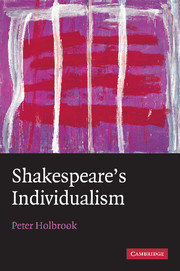Book contents
- Frontmatter
- Contents
- Acknowledgements
- Introduction
- PART I SHAKESPEARE, HAMLET, SELFHOOD
- PART II SHAKESPEARE AND EVIL
- 9 ‘Old lad, I am thine own’: authenticity and Titus Andronicus
- 10 Evil and self-creation
- 11 Libertarian Shakespeare: Mill, Bradley
- 12 Shakespearean immoral individualism: Gide
- 13 Strange Shakespeare: Symons and others
- 14 Eliot's rejection of Shakespeare
- 15 Shakespearean immoralism: Antony and Cleopatra
- 16 Making oneself known: Montaigne and the Sonnets
- PART III SHAKESPEARE AND SELF-GOVERNMENT
- Conclusion: Shakespeare's ‘beauteous freedom’
- Index
- References
9 - ‘Old lad, I am thine own’: authenticity and Titus Andronicus
Published online by Cambridge University Press: 06 July 2010
- Frontmatter
- Contents
- Acknowledgements
- Introduction
- PART I SHAKESPEARE, HAMLET, SELFHOOD
- PART II SHAKESPEARE AND EVIL
- 9 ‘Old lad, I am thine own’: authenticity and Titus Andronicus
- 10 Evil and self-creation
- 11 Libertarian Shakespeare: Mill, Bradley
- 12 Shakespearean immoral individualism: Gide
- 13 Strange Shakespeare: Symons and others
- 14 Eliot's rejection of Shakespeare
- 15 Shakespearean immoralism: Antony and Cleopatra
- 16 Making oneself known: Montaigne and the Sonnets
- PART III SHAKESPEARE AND SELF-GOVERNMENT
- Conclusion: Shakespeare's ‘beauteous freedom’
- Index
- References
Summary
One's own free and unfettered volition, one's own caprice, however wild, one's own fancy, inflamed sometimes to the point of madness – that is the one best and greatest good … What a man needs is simply and solely independent volition, whatever that independence may cost and wherever it may lead. Well, but the devil only knows what volition …
Dostoyevsky, Notes from Underground (1864), trans. J. Coulson (Harmondsworth, 1972), 33–4.In Titus Andronicus Rome is nothing but ‘a wilderness of tigers’ (III.i.54). Like the history plays, Titus explores the catastrophic consequences of the will to power. Politicians mouth civic pieties but ruthlessly compete with each other. Saturninus and Bassianus – brothers ‘that strive by factions and by friends/Ambitiously for rule’ (I.i.18–19) – contest the emperorship. However, the charismatic figure at the centre of the play is not one of the social elite but Aaron, a Moor. Aaron is one of Shakespeare's more aggressive self-made men. A scheming ambitious outsider, like the illegitimate Edmund in Lear, or the frustrated and resentful middle-ranking officer Iago, he has abundant wit combined with tireless will. And so ‘Away with slavish weeds and servile thoughts!’ (II.i.18).
In Titus Shakespeare announces a characteristic theme: the knowingly wicked character who affirms his own nature. Aaron embraces his exotic racial identity. ‘Let fools do good’, he confides, ‘and fair men call for grace,/Aaron will have his soul black like his face’ (III.i.204–5). He is also the only villain in Titus with a self.
- Type
- Chapter
- Information
- Shakespeare's Individualism , pp. 103 - 109Publisher: Cambridge University PressPrint publication year: 2010



